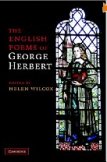

In the same year he received from King Charles I the living of Bemerton, near Salisbury. His mother died in 1627. He then resigned the Oratorship at Cambridge, and in 1630 was very happily married to Jane, daughter of Charles Danvers, Esq., of Bainton, Wilts, a kinsman of the Earl of Danby. Change of air and attention to diet for a time afforded him relief. He is said to have removed to Woodford, in Essex. About the year 1629, his health began to fail by the inroads of disease, which first attacked him in the form of quotidian ague. There he found the church in ruins, and by the assistance of his rich kinsmen and friends, rebuilt and beautified it. In July 1626, he was made prebend of Layton Ecclesia, a village in the county of Huntingdon. In his retirement he meditated upon his position and prospects and, after much conflict of mind, he resolved to give up the more attractive pleasures of the Court, and to devote himself to the work of the ministry. But the death of the King, and of some other powerful friends, put an end to his hopes of Court-favour, and he retired to live with a friend in Kent. This kept alive his hope of being appointed a Secretary of State, and he learned some modern languages to qualify himself for that position. During this period the University was visited by King James I, the great philosopher Sir Francis Bacon, Bishop Andrews, and other eminent personages, from whom he received marks of favour when the duties of his office brought him under their notice. In 1619, he was chosen Orator for the University, an office he filled with honour for eight years. And, along with severer studies, he gave much attention to music, of which he was very fond. in the year 1611, Major Fellow of the College, March 15, 1615, and M.A.

It was sent as a testimony that his “poor abilities in poetry should be all and ever consecrated to God's glory.” Soon after his arrival he sent his mother a sonnet, which gave promise of the peculiarities and excellences of his later style. After receiving some home education, he studied at Westminster School, and at the age of 15 was elected therefrom to Trinity College, Cambridge, whither he went. George was the fifth son in a family of ten children. His mother, to whom he was much indebted, and the more because of the early death of his father, was the youngest daughter of Sir Richard Newport.

On the father’s side he belonged to the family of the Earl of Pembroke, and his eldest brother was the eminent philosophical writer, Lord Herbert of Cherbury. GEORGE HERBERT of Bemerton, the prince and model of all country parsons, was born in the castle that had long been held by his illustrious ancestors, near Montgomery, on April 3, 1593.


 0 kommentar(er)
0 kommentar(er)
